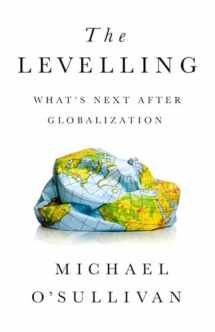
The Levelling: What's Next After Globalization
ISBN-13:
9781541724068
ISBN-10:
1541724062
Author:
Michael OSullivan
Publication date:
2019
Publisher:
PublicAffairs
Format:
Hardcover
368 pages
Category:
Economic Conditions
,
Economics
,
Globalization
,
International Business
FREE US shipping
Book details
ISBN-13:
9781541724068
ISBN-10:
1541724062
Author:
Michael OSullivan
Publication date:
2019
Publisher:
PublicAffairs
Format:
Hardcover
368 pages
Category:
Economic Conditions
,
Economics
,
Globalization
,
International Business
Summary
The Levelling: What's Next After Globalization (ISBN-13: 9781541724068 and ISBN-10: 1541724062), written by authors
Michael OSullivan, was published by PublicAffairs in 2019.
With an overall rating of 3.6 stars, it's a notable title among other
Economic Conditions
(Economics, Globalization, International Business) books. You can easily purchase or rent The Levelling: What's Next After Globalization (Hardcover) from BooksRun,
along with many other new and used
Economic Conditions
books
and textbooks.
And, if you're looking to sell your copy, our current buyback offer is $0.36.
Description
A brilliant analysis of the transition in world economics, finance, and power as the era of globalization ends and gives way to new power centers and institutions.
The world is at a turning point similar to the fall of communism. Then, many focused on the collapse itself, and failed to see that a bigger trend, globalization, was about to take hold. The benefits of globalization--through the freer flow of money, people, ideas, and trade--have been many. But rather than a world that is flat, what has emerged is one of jagged peaks and rough, deep valleys characterized by wealth inequality, indebtedness, political recession, and imbalances across the world's economies.
These peaks and valleys are undergoing what Michael O'Sullivan calls "the levelling"--a major transition in world economics, finance, and power. What's next is a levelling-out of wealth between poor and rich countries, of power between nations and regions, of political accountability from elites to the people, and of institutional power away from central banks and defunct twentieth-century institutions such as the WTO and the IMF.
O'Sullivan then moves to ways we can develop new, pragmatic solutions to such critical problems as political discontent, stunted economic growth, the productive functioning of finance, and political-economic structures that serve broader needs.
The Levelling comes at a crucial time in the rise and fall of nations. It has special importance for the US as its place in the world undergoes radical change--the ebbing of influence, profound questions over its economic model, societal decay, and the turmoil of public life.
The world is at a turning point similar to the fall of communism. Then, many focused on the collapse itself, and failed to see that a bigger trend, globalization, was about to take hold. The benefits of globalization--through the freer flow of money, people, ideas, and trade--have been many. But rather than a world that is flat, what has emerged is one of jagged peaks and rough, deep valleys characterized by wealth inequality, indebtedness, political recession, and imbalances across the world's economies.
These peaks and valleys are undergoing what Michael O'Sullivan calls "the levelling"--a major transition in world economics, finance, and power. What's next is a levelling-out of wealth between poor and rich countries, of power between nations and regions, of political accountability from elites to the people, and of institutional power away from central banks and defunct twentieth-century institutions such as the WTO and the IMF.
O'Sullivan then moves to ways we can develop new, pragmatic solutions to such critical problems as political discontent, stunted economic growth, the productive functioning of finance, and political-economic structures that serve broader needs.
The Levelling comes at a crucial time in the rise and fall of nations. It has special importance for the US as its place in the world undergoes radical change--the ebbing of influence, profound questions over its economic model, societal decay, and the turmoil of public life.


We would LOVE it if you could help us and other readers by reviewing the book
Book review

Congratulations! We have received your book review.
{user}
{createdAt}
by {truncated_author}


